Impact of Social Media on Consumer Brand Relationships in Luxury
VerifiedAdded on 2020/03/28
|7
|2083
|51
Report
AI Summary
This report investigates the dynamic relationship between social media and the luxury industry, focusing on consumer behavior and online marketing strategies. The study begins with an introduction highlighting the pervasive use of social media and its impact on consumer-brand interactions. It then delves into the research context, problem, and literature review, emphasizing the importance of understanding consumer motivations for online shopping, particularly within the luxury sector. The research aims to identify motivational factors driving online purchases and evaluate the influence of blogs on consumer behavior. The report outlines the research objectives and expected outcomes, including insights into consumer behavior, blog impact, and the effectiveness of social media as a marketing tool. The research methodology adopts an interpretive approach, utilizing inductive reasoning, qualitative data analysis, and semi-structured interviews, with a focus on understanding consumer perspectives through observations and interviews. Ethical considerations are addressed, ensuring respect for participants' cultural beliefs. The report concludes with a theoretical framework and the planned use of interview questions aligned with the research objectives, along with a random participant selection process from the University of Manchester.
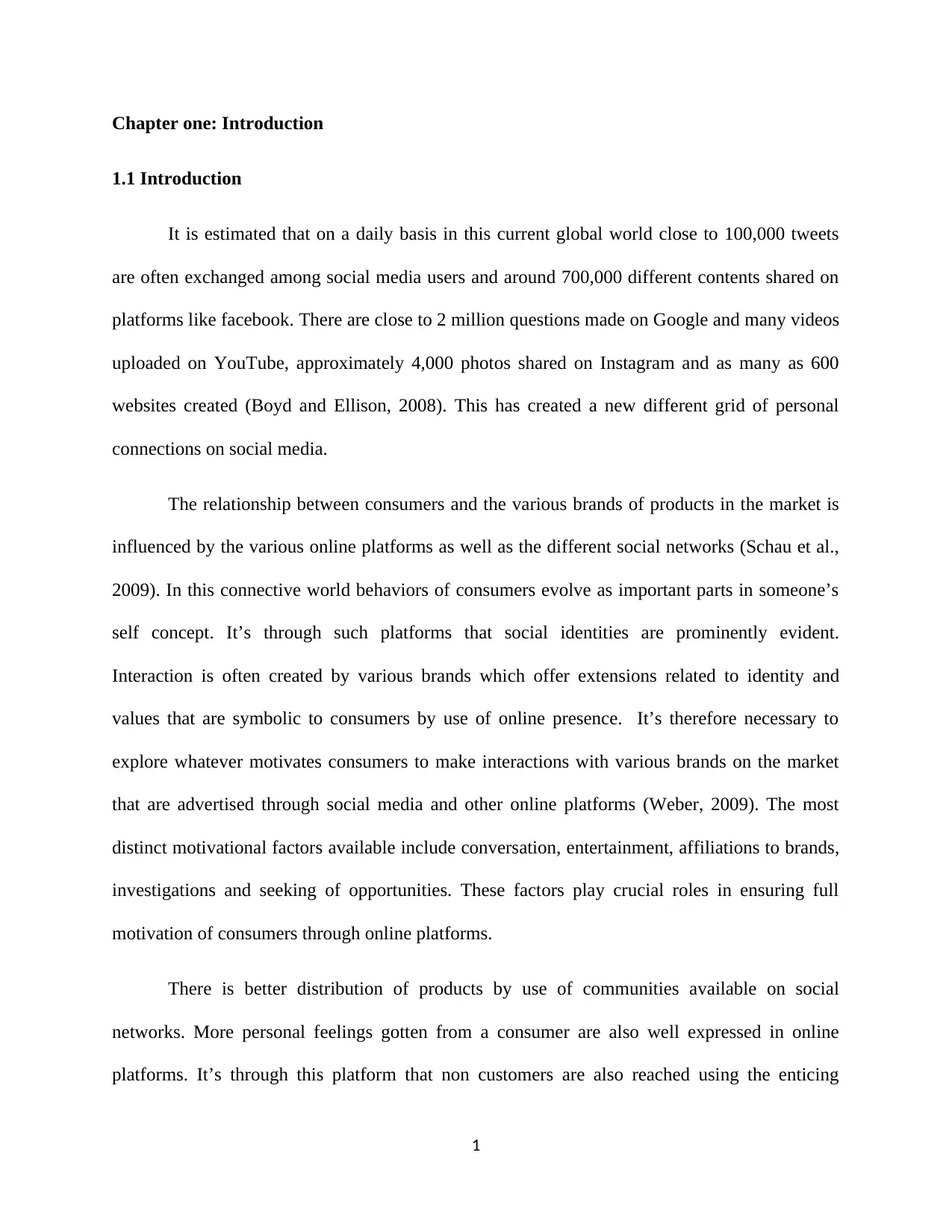
Chapter one: Introduction
1.1 Introduction
It is estimated that on a daily basis in this current global world close to 100,000 tweets
are often exchanged among social media users and around 700,000 different contents shared on
platforms like facebook. There are close to 2 million questions made on Google and many videos
uploaded on YouTube, approximately 4,000 photos shared on Instagram and as many as 600
websites created (Boyd and Ellison, 2008). This has created a new different grid of personal
connections on social media.
The relationship between consumers and the various brands of products in the market is
influenced by the various online platforms as well as the different social networks (Schau et al.,
2009). In this connective world behaviors of consumers evolve as important parts in someone’s
self concept. It’s through such platforms that social identities are prominently evident.
Interaction is often created by various brands which offer extensions related to identity and
values that are symbolic to consumers by use of online presence. It’s therefore necessary to
explore whatever motivates consumers to make interactions with various brands on the market
that are advertised through social media and other online platforms (Weber, 2009). The most
distinct motivational factors available include conversation, entertainment, affiliations to brands,
investigations and seeking of opportunities. These factors play crucial roles in ensuring full
motivation of consumers through online platforms.
There is better distribution of products by use of communities available on social
networks. More personal feelings gotten from a consumer are also well expressed in online
platforms. It’s through this platform that non customers are also reached using the enticing
1
1.1 Introduction
It is estimated that on a daily basis in this current global world close to 100,000 tweets
are often exchanged among social media users and around 700,000 different contents shared on
platforms like facebook. There are close to 2 million questions made on Google and many videos
uploaded on YouTube, approximately 4,000 photos shared on Instagram and as many as 600
websites created (Boyd and Ellison, 2008). This has created a new different grid of personal
connections on social media.
The relationship between consumers and the various brands of products in the market is
influenced by the various online platforms as well as the different social networks (Schau et al.,
2009). In this connective world behaviors of consumers evolve as important parts in someone’s
self concept. It’s through such platforms that social identities are prominently evident.
Interaction is often created by various brands which offer extensions related to identity and
values that are symbolic to consumers by use of online presence. It’s therefore necessary to
explore whatever motivates consumers to make interactions with various brands on the market
that are advertised through social media and other online platforms (Weber, 2009). The most
distinct motivational factors available include conversation, entertainment, affiliations to brands,
investigations and seeking of opportunities. These factors play crucial roles in ensuring full
motivation of consumers through online platforms.
There is better distribution of products by use of communities available on social
networks. More personal feelings gotten from a consumer are also well expressed in online
platforms. It’s through this platform that non customers are also reached using the enticing
1
Paraphrase This Document
Need a fresh take? Get an instant paraphrase of this document with our AI Paraphraser
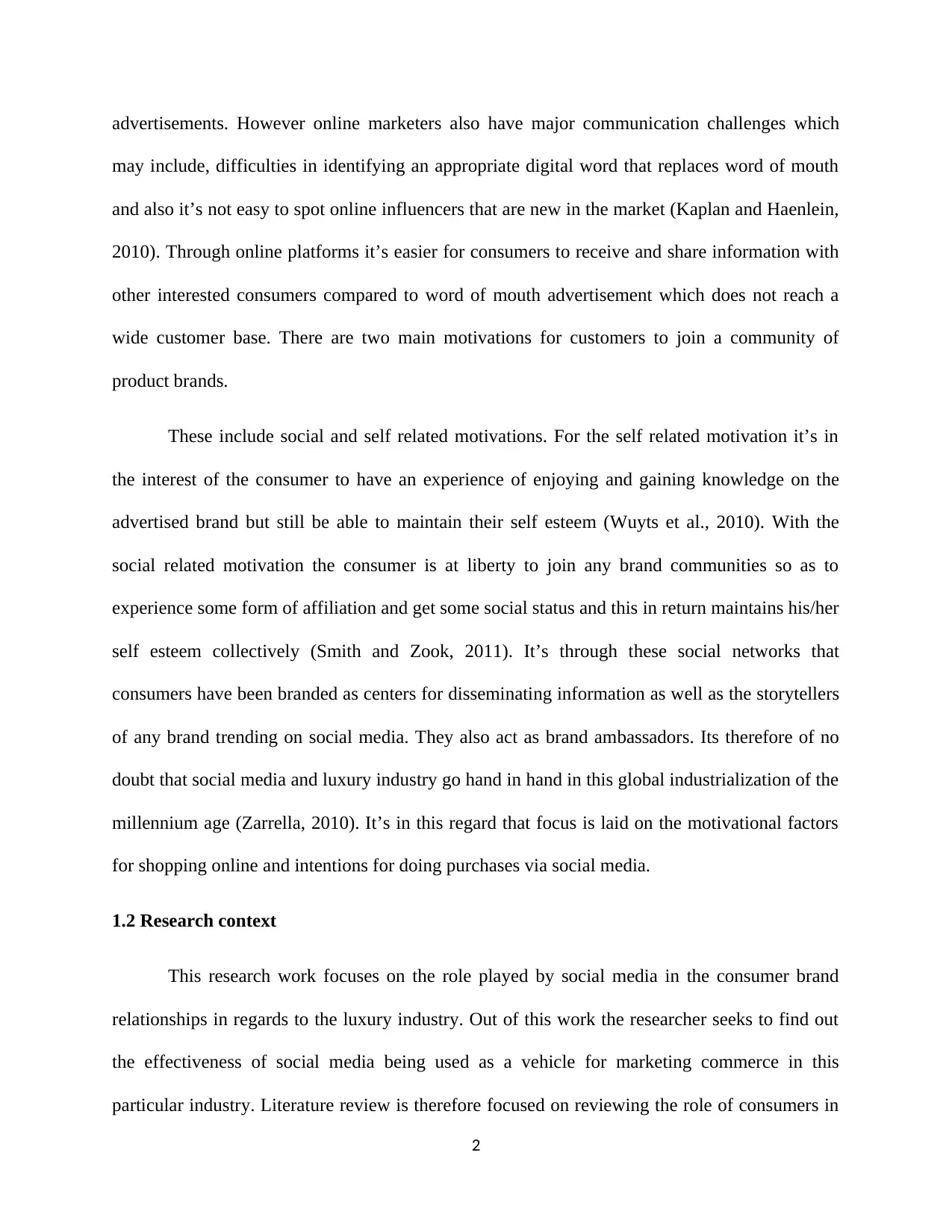
advertisements. However online marketers also have major communication challenges which
may include, difficulties in identifying an appropriate digital word that replaces word of mouth
and also it’s not easy to spot online influencers that are new in the market (Kaplan and Haenlein,
2010). Through online platforms it’s easier for consumers to receive and share information with
other interested consumers compared to word of mouth advertisement which does not reach a
wide customer base. There are two main motivations for customers to join a community of
product brands.
These include social and self related motivations. For the self related motivation it’s in
the interest of the consumer to have an experience of enjoying and gaining knowledge on the
advertised brand but still be able to maintain their self esteem (Wuyts et al., 2010). With the
social related motivation the consumer is at liberty to join any brand communities so as to
experience some form of affiliation and get some social status and this in return maintains his/her
self esteem collectively (Smith and Zook, 2011). It’s through these social networks that
consumers have been branded as centers for disseminating information as well as the storytellers
of any brand trending on social media. They also act as brand ambassadors. Its therefore of no
doubt that social media and luxury industry go hand in hand in this global industrialization of the
millennium age (Zarrella, 2010). It’s in this regard that focus is laid on the motivational factors
for shopping online and intentions for doing purchases via social media.
1.2 Research context
This research work focuses on the role played by social media in the consumer brand
relationships in regards to the luxury industry. Out of this work the researcher seeks to find out
the effectiveness of social media being used as a vehicle for marketing commerce in this
particular industry. Literature review is therefore focused on reviewing the role of consumers in
2
may include, difficulties in identifying an appropriate digital word that replaces word of mouth
and also it’s not easy to spot online influencers that are new in the market (Kaplan and Haenlein,
2010). Through online platforms it’s easier for consumers to receive and share information with
other interested consumers compared to word of mouth advertisement which does not reach a
wide customer base. There are two main motivations for customers to join a community of
product brands.
These include social and self related motivations. For the self related motivation it’s in
the interest of the consumer to have an experience of enjoying and gaining knowledge on the
advertised brand but still be able to maintain their self esteem (Wuyts et al., 2010). With the
social related motivation the consumer is at liberty to join any brand communities so as to
experience some form of affiliation and get some social status and this in return maintains his/her
self esteem collectively (Smith and Zook, 2011). It’s through these social networks that
consumers have been branded as centers for disseminating information as well as the storytellers
of any brand trending on social media. They also act as brand ambassadors. Its therefore of no
doubt that social media and luxury industry go hand in hand in this global industrialization of the
millennium age (Zarrella, 2010). It’s in this regard that focus is laid on the motivational factors
for shopping online and intentions for doing purchases via social media.
1.2 Research context
This research work focuses on the role played by social media in the consumer brand
relationships in regards to the luxury industry. Out of this work the researcher seeks to find out
the effectiveness of social media being used as a vehicle for marketing commerce in this
particular industry. Literature review is therefore focused on reviewing the role of consumers in
2
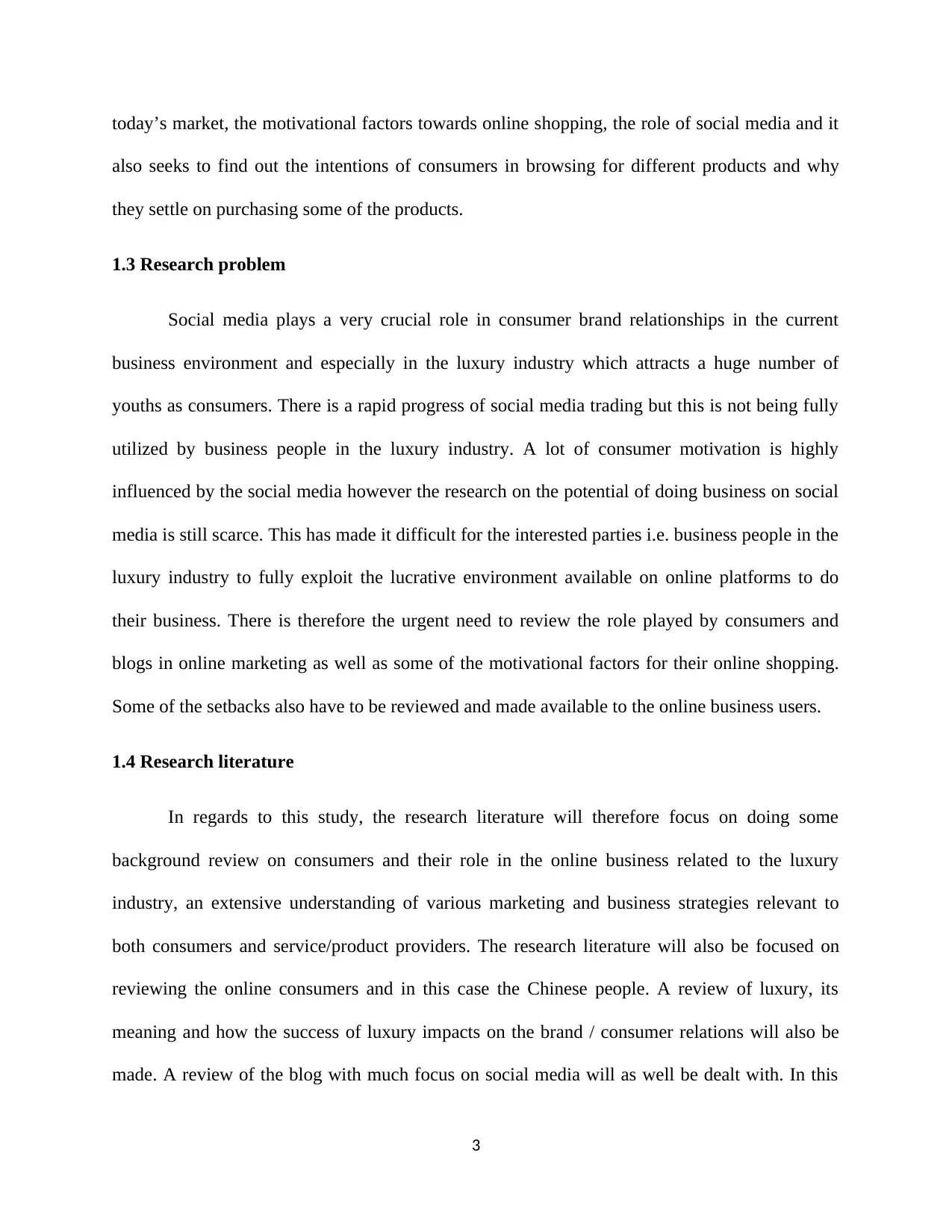
today’s market, the motivational factors towards online shopping, the role of social media and it
also seeks to find out the intentions of consumers in browsing for different products and why
they settle on purchasing some of the products.
1.3 Research problem
Social media plays a very crucial role in consumer brand relationships in the current
business environment and especially in the luxury industry which attracts a huge number of
youths as consumers. There is a rapid progress of social media trading but this is not being fully
utilized by business people in the luxury industry. A lot of consumer motivation is highly
influenced by the social media however the research on the potential of doing business on social
media is still scarce. This has made it difficult for the interested parties i.e. business people in the
luxury industry to fully exploit the lucrative environment available on online platforms to do
their business. There is therefore the urgent need to review the role played by consumers and
blogs in online marketing as well as some of the motivational factors for their online shopping.
Some of the setbacks also have to be reviewed and made available to the online business users.
1.4 Research literature
In regards to this study, the research literature will therefore focus on doing some
background review on consumers and their role in the online business related to the luxury
industry, an extensive understanding of various marketing and business strategies relevant to
both consumers and service/product providers. The research literature will also be focused on
reviewing the online consumers and in this case the Chinese people. A review of luxury, its
meaning and how the success of luxury impacts on the brand / consumer relations will also be
made. A review of the blog with much focus on social media will as well be dealt with. In this
3
also seeks to find out the intentions of consumers in browsing for different products and why
they settle on purchasing some of the products.
1.3 Research problem
Social media plays a very crucial role in consumer brand relationships in the current
business environment and especially in the luxury industry which attracts a huge number of
youths as consumers. There is a rapid progress of social media trading but this is not being fully
utilized by business people in the luxury industry. A lot of consumer motivation is highly
influenced by the social media however the research on the potential of doing business on social
media is still scarce. This has made it difficult for the interested parties i.e. business people in the
luxury industry to fully exploit the lucrative environment available on online platforms to do
their business. There is therefore the urgent need to review the role played by consumers and
blogs in online marketing as well as some of the motivational factors for their online shopping.
Some of the setbacks also have to be reviewed and made available to the online business users.
1.4 Research literature
In regards to this study, the research literature will therefore focus on doing some
background review on consumers and their role in the online business related to the luxury
industry, an extensive understanding of various marketing and business strategies relevant to
both consumers and service/product providers. The research literature will also be focused on
reviewing the online consumers and in this case the Chinese people. A review of luxury, its
meaning and how the success of luxury impacts on the brand / consumer relations will also be
made. A review of the blog with much focus on social media will as well be dealt with. In this
3
⊘ This is a preview!⊘
Do you want full access?
Subscribe today to unlock all pages.

Trusted by 1+ million students worldwide
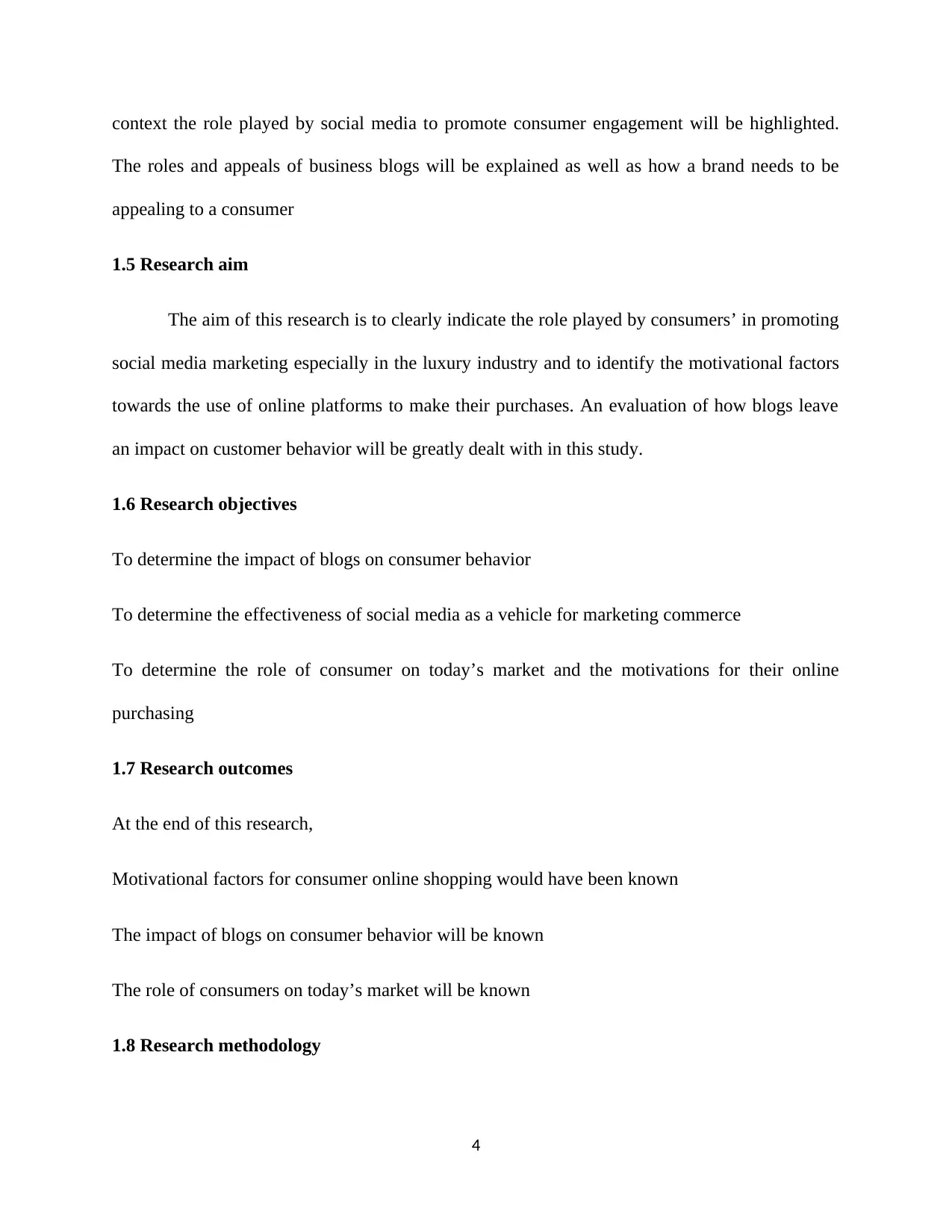
context the role played by social media to promote consumer engagement will be highlighted.
The roles and appeals of business blogs will be explained as well as how a brand needs to be
appealing to a consumer
1.5 Research aim
The aim of this research is to clearly indicate the role played by consumers’ in promoting
social media marketing especially in the luxury industry and to identify the motivational factors
towards the use of online platforms to make their purchases. An evaluation of how blogs leave
an impact on customer behavior will be greatly dealt with in this study.
1.6 Research objectives
To determine the impact of blogs on consumer behavior
To determine the effectiveness of social media as a vehicle for marketing commerce
To determine the role of consumer on today’s market and the motivations for their online
purchasing
1.7 Research outcomes
At the end of this research,
Motivational factors for consumer online shopping would have been known
The impact of blogs on consumer behavior will be known
The role of consumers on today’s market will be known
1.8 Research methodology
4
The roles and appeals of business blogs will be explained as well as how a brand needs to be
appealing to a consumer
1.5 Research aim
The aim of this research is to clearly indicate the role played by consumers’ in promoting
social media marketing especially in the luxury industry and to identify the motivational factors
towards the use of online platforms to make their purchases. An evaluation of how blogs leave
an impact on customer behavior will be greatly dealt with in this study.
1.6 Research objectives
To determine the impact of blogs on consumer behavior
To determine the effectiveness of social media as a vehicle for marketing commerce
To determine the role of consumer on today’s market and the motivations for their online
purchasing
1.7 Research outcomes
At the end of this research,
Motivational factors for consumer online shopping would have been known
The impact of blogs on consumer behavior will be known
The role of consumers on today’s market will be known
1.8 Research methodology
4
Paraphrase This Document
Need a fresh take? Get an instant paraphrase of this document with our AI Paraphraser
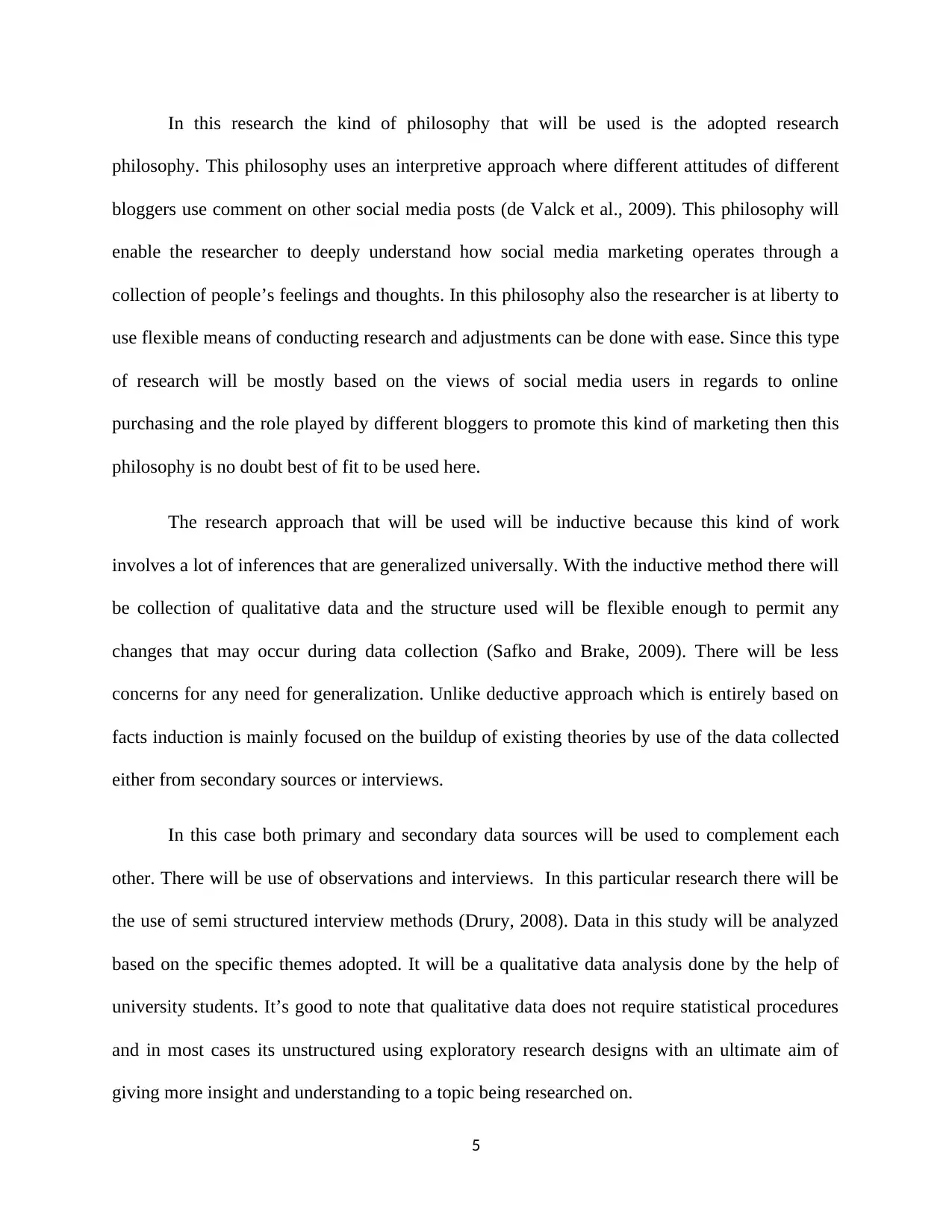
In this research the kind of philosophy that will be used is the adopted research
philosophy. This philosophy uses an interpretive approach where different attitudes of different
bloggers use comment on other social media posts (de Valck et al., 2009). This philosophy will
enable the researcher to deeply understand how social media marketing operates through a
collection of people’s feelings and thoughts. In this philosophy also the researcher is at liberty to
use flexible means of conducting research and adjustments can be done with ease. Since this type
of research will be mostly based on the views of social media users in regards to online
purchasing and the role played by different bloggers to promote this kind of marketing then this
philosophy is no doubt best of fit to be used here.
The research approach that will be used will be inductive because this kind of work
involves a lot of inferences that are generalized universally. With the inductive method there will
be collection of qualitative data and the structure used will be flexible enough to permit any
changes that may occur during data collection (Safko and Brake, 2009). There will be less
concerns for any need for generalization. Unlike deductive approach which is entirely based on
facts induction is mainly focused on the buildup of existing theories by use of the data collected
either from secondary sources or interviews.
In this case both primary and secondary data sources will be used to complement each
other. There will be use of observations and interviews. In this particular research there will be
the use of semi structured interview methods (Drury, 2008). Data in this study will be analyzed
based on the specific themes adopted. It will be a qualitative data analysis done by the help of
university students. It’s good to note that qualitative data does not require statistical procedures
and in most cases its unstructured using exploratory research designs with an ultimate aim of
giving more insight and understanding to a topic being researched on.
5
philosophy. This philosophy uses an interpretive approach where different attitudes of different
bloggers use comment on other social media posts (de Valck et al., 2009). This philosophy will
enable the researcher to deeply understand how social media marketing operates through a
collection of people’s feelings and thoughts. In this philosophy also the researcher is at liberty to
use flexible means of conducting research and adjustments can be done with ease. Since this type
of research will be mostly based on the views of social media users in regards to online
purchasing and the role played by different bloggers to promote this kind of marketing then this
philosophy is no doubt best of fit to be used here.
The research approach that will be used will be inductive because this kind of work
involves a lot of inferences that are generalized universally. With the inductive method there will
be collection of qualitative data and the structure used will be flexible enough to permit any
changes that may occur during data collection (Safko and Brake, 2009). There will be less
concerns for any need for generalization. Unlike deductive approach which is entirely based on
facts induction is mainly focused on the buildup of existing theories by use of the data collected
either from secondary sources or interviews.
In this case both primary and secondary data sources will be used to complement each
other. There will be use of observations and interviews. In this particular research there will be
the use of semi structured interview methods (Drury, 2008). Data in this study will be analyzed
based on the specific themes adopted. It will be a qualitative data analysis done by the help of
university students. It’s good to note that qualitative data does not require statistical procedures
and in most cases its unstructured using exploratory research designs with an ultimate aim of
giving more insight and understanding to a topic being researched on.
5
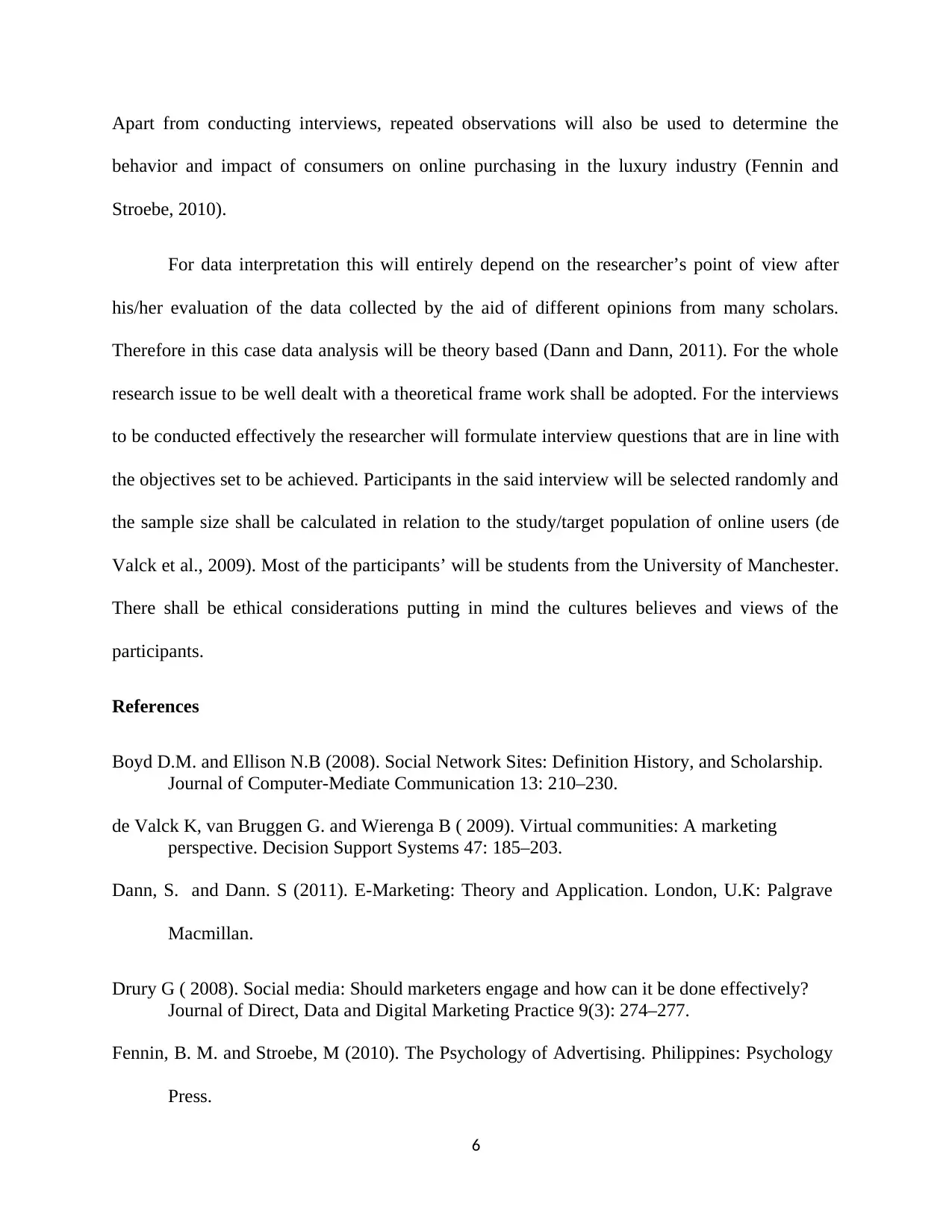
Apart from conducting interviews, repeated observations will also be used to determine the
behavior and impact of consumers on online purchasing in the luxury industry (Fennin and
Stroebe, 2010).
For data interpretation this will entirely depend on the researcher’s point of view after
his/her evaluation of the data collected by the aid of different opinions from many scholars.
Therefore in this case data analysis will be theory based (Dann and Dann, 2011). For the whole
research issue to be well dealt with a theoretical frame work shall be adopted. For the interviews
to be conducted effectively the researcher will formulate interview questions that are in line with
the objectives set to be achieved. Participants in the said interview will be selected randomly and
the sample size shall be calculated in relation to the study/target population of online users (de
Valck et al., 2009). Most of the participants’ will be students from the University of Manchester.
There shall be ethical considerations putting in mind the cultures believes and views of the
participants.
References
Boyd D.M. and Ellison N.B (2008). Social Network Sites: Definition History, and Scholarship.
Journal of Computer-Mediate Communication 13: 210–230.
de Valck K, van Bruggen G. and Wierenga B ( 2009). Virtual communities: A marketing
perspective. Decision Support Systems 47: 185–203.
Dann, S. and Dann. S (2011). E-Marketing: Theory and Application. London, U.K: Palgrave
Macmillan.
Drury G ( 2008). Social media: Should marketers engage and how can it be done effectively?
Journal of Direct, Data and Digital Marketing Practice 9(3): 274–277.
Fennin, B. M. and Stroebe, M (2010). The Psychology of Advertising. Philippines: Psychology
Press.
6
behavior and impact of consumers on online purchasing in the luxury industry (Fennin and
Stroebe, 2010).
For data interpretation this will entirely depend on the researcher’s point of view after
his/her evaluation of the data collected by the aid of different opinions from many scholars.
Therefore in this case data analysis will be theory based (Dann and Dann, 2011). For the whole
research issue to be well dealt with a theoretical frame work shall be adopted. For the interviews
to be conducted effectively the researcher will formulate interview questions that are in line with
the objectives set to be achieved. Participants in the said interview will be selected randomly and
the sample size shall be calculated in relation to the study/target population of online users (de
Valck et al., 2009). Most of the participants’ will be students from the University of Manchester.
There shall be ethical considerations putting in mind the cultures believes and views of the
participants.
References
Boyd D.M. and Ellison N.B (2008). Social Network Sites: Definition History, and Scholarship.
Journal of Computer-Mediate Communication 13: 210–230.
de Valck K, van Bruggen G. and Wierenga B ( 2009). Virtual communities: A marketing
perspective. Decision Support Systems 47: 185–203.
Dann, S. and Dann. S (2011). E-Marketing: Theory and Application. London, U.K: Palgrave
Macmillan.
Drury G ( 2008). Social media: Should marketers engage and how can it be done effectively?
Journal of Direct, Data and Digital Marketing Practice 9(3): 274–277.
Fennin, B. M. and Stroebe, M (2010). The Psychology of Advertising. Philippines: Psychology
Press.
6
⊘ This is a preview!⊘
Do you want full access?
Subscribe today to unlock all pages.

Trusted by 1+ million students worldwide
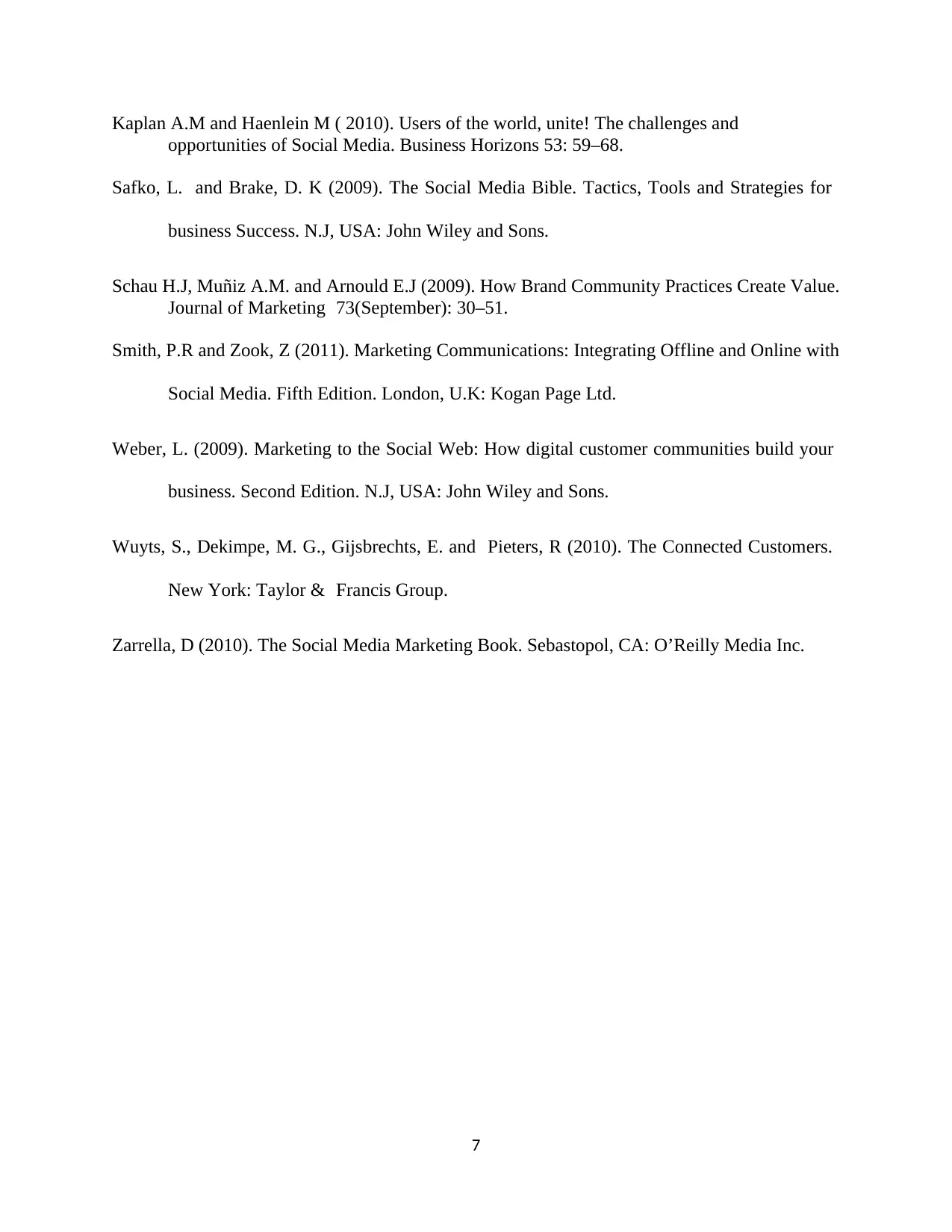
Kaplan A.M and Haenlein M ( 2010). Users of the world, unite! The challenges and
opportunities of Social Media. Business Horizons 53: 59–68.
Safko, L. and Brake, D. K (2009). The Social Media Bible. Tactics, Tools and Strategies for
business Success. N.J, USA: John Wiley and Sons.
Schau H.J, Muñiz A.M. and Arnould E.J (2009). How Brand Community Practices Create Value.
Journal of Marketing 73(September): 30–51.
Smith, P.R and Zook, Z (2011). Marketing Communications: Integrating Offline and Online with
Social Media. Fifth Edition. London, U.K: Kogan Page Ltd.
Weber, L. (2009). Marketing to the Social Web: How digital customer communities build your
business. Second Edition. N.J, USA: John Wiley and Sons.
Wuyts, S., Dekimpe, M. G., Gijsbrechts, E. and Pieters, R (2010). The Connected Customers.
New York: Taylor & Francis Group.
Zarrella, D (2010). The Social Media Marketing Book. Sebastopol, CA: O’Reilly Media Inc.
7
opportunities of Social Media. Business Horizons 53: 59–68.
Safko, L. and Brake, D. K (2009). The Social Media Bible. Tactics, Tools and Strategies for
business Success. N.J, USA: John Wiley and Sons.
Schau H.J, Muñiz A.M. and Arnould E.J (2009). How Brand Community Practices Create Value.
Journal of Marketing 73(September): 30–51.
Smith, P.R and Zook, Z (2011). Marketing Communications: Integrating Offline and Online with
Social Media. Fifth Edition. London, U.K: Kogan Page Ltd.
Weber, L. (2009). Marketing to the Social Web: How digital customer communities build your
business. Second Edition. N.J, USA: John Wiley and Sons.
Wuyts, S., Dekimpe, M. G., Gijsbrechts, E. and Pieters, R (2010). The Connected Customers.
New York: Taylor & Francis Group.
Zarrella, D (2010). The Social Media Marketing Book. Sebastopol, CA: O’Reilly Media Inc.
7
1 out of 7
Related Documents
Your All-in-One AI-Powered Toolkit for Academic Success.
+13062052269
info@desklib.com
Available 24*7 on WhatsApp / Email
![[object Object]](/_next/static/media/star-bottom.7253800d.svg)
Unlock your academic potential
Copyright © 2020–2026 A2Z Services. All Rights Reserved. Developed and managed by ZUCOL.





